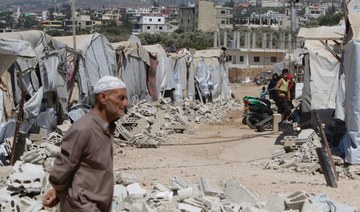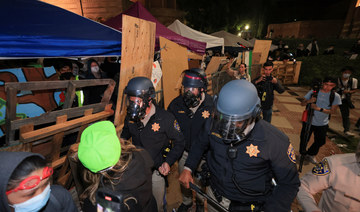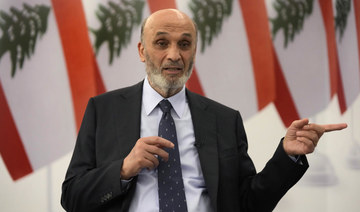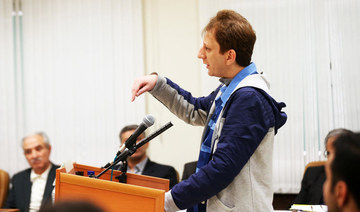BEIRUT: Lebanon is expected to begin implementing in October a set of economic and financial measures agreed by its top leadership that will boost economic growth, President Michel Aoun said on Sunday, vowing that he would to tend to this himself.
He was referring to decisions taken at a top-level meeting earlier this month with the aim of reviving an economy that has been growing slowly for years and is struggling with one of the world’s heaviest public debt burdens.
After the Aug. 9 meeting, Prime Minister Saad Al-Hariri said agreed steps included finishing the 2020 budget on time, drawing up a plan to start $3.3 billion of projects approved by parliament, full implementation of a power sector reform plan, and laws to fight tax evasion and regulate public tenders.
“I will personally tend to the implementation path of the decisions of the financial and economic meeting” in cooperation with Prime Minister Saad Al-Hariri, Parliament Speaker Nabih Berri and other parties in government, Aoun said.
In written comments to Reuters, Aoun said this aimed “to guarantee political stability in cabinet and outside it and to secure the greatest amount of productivity,” including in the implementation of the 2019 budget and its reforms.
Aoun said he expected “the implementation path” to begin “with the start of October after the conclusion of the current preparations ... which will lead to lifting of the growth rates, reflecting positively on the economic and financial situations.”
After years of backsliding on economic reform, the impetus to act has grown due to economic stagnation and a slowdown in the flow of dollars into Lebanon’s banks from abroad. Lebanon has depended on such flows from its diaspora to finance the current account and the state budget deficits.
Foreign governments and donor institutions last year pledged $11 billion in financing to Lebanon for major infrastructure at the so-called Cedre conference in Paris, on condition that it carries out reforms.
Measures to reduce the budget deficit and reform the power sector, which bleeds public funds while inflicting daily power cuts on Lebanese, are seen as two vital tests of the government’s ability to reform.
The International Monetary Fund said in July this year’s deficit is likely to be well above a targeted 7.6% of national output.
It said the power reform plan and a budget to reduce the deficit were “very welcome first steps” and “further substantial fiscal adjustment and structural reforms” were needed.
Aoun said work was underway to approve the 2020 budget in the constitutional timeframe.
It would include “new, resolute reforms” agreed at the Aug. 9 meeting to reduce the power sector deficit, improve tax collection and fight customs and tax evasion.
Aoun also said frameworks must be put in place for implementing a plan drawn up by management consulting firm McKinsey for revamping the economy and this should coincide with the start of projects outlined at the Cedre conference.
Lebanon’s Aoun vows to tend to economic, financial reforms
Lebanon’s Aoun vows to tend to economic, financial reforms

- Aoun said this aimed “to guarantee political stability in cabinet and outside it and to secure the greatest amount of productivity”
- He expected “the implementation path” to begin “with the start of October"
Iraq students rally for Gaza and US campus protests
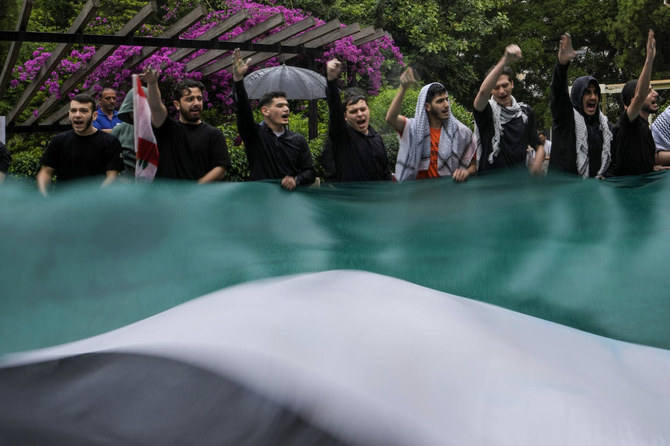
BAGHDAD: Dozens of Iraqi university students and professors rallied Thursday at a Baghdad campus in solidarity with Gaza and pro-Palestinian protests at US universities, AFP correspondents said.
Iraqi Education Minister Naeem Al-Aboudi earlier this week expressed his support for the “free voices in universities” around the world, and called for protests in solidarity with the embattled Gaza Strip.
Students at Al-Nahrain University waved the Palestinian and Iraqi flags.
“With all that is happening to our people in Gaza... of course I must be among the first to come to raise our voice,” student Aya Kader, 20, said.
“It is very positive to see the Palestinian flag being waved at American universities,” she said.
Weeks-long pro-Palestinian protests that have swept campuses across the United States have “encouraged us,” she added.
Students and professors also carried banners calling for a “free Palestine,” with some wearing the keffiyeh scarf that has long been a symbol of the Palestinian cause.
“We are here to tell them to stop the killing and to thank the free voices around the world,” said Professor Jomaa Salman, head of the engineering faculty.
“If the storming of Columbia University had happened in another country, especially in a third world country, they would have moved heaven on earth.”
The Iraqi embassy in Washington called Wednesday for “restraint, calm, respect for human rights and peaceful expression” as unrest over Israel’s war in Gaza simmered on US campuses.
Iraq does not recognize Israel while all Iraqi political factions support the Palestinian people.
In 2019, popular protests broke out in Iraq against the ruling establishment, and a security crackdown left more than 600 people killed.
The United States is Israel’s largest military supplier.
Student protesters on American campuses say they are expressing solidarity with Palestinians in the war-devastated Gaza Strip, prompting large-scale police arrests.
The Gaza war broke out after the unprecedented October 7 Hamas attack on southern Israel which resulted in the death of 1,170 people, mostly civilians, according to an AFP tally based on Israeli official figures.
Vowing to destroy Hamas, Israel retaliated with a massive offensive that has killed at least 34,596 people in Gaza, mostly women and children, according to the health ministry in the Hamas-run territory.
Militants also seized hostages during the attack, estimating that 129 of them remain in Gaza, including 34 the military says are dead.
UAE FM discusses Gaza with Israel’s opposition leader
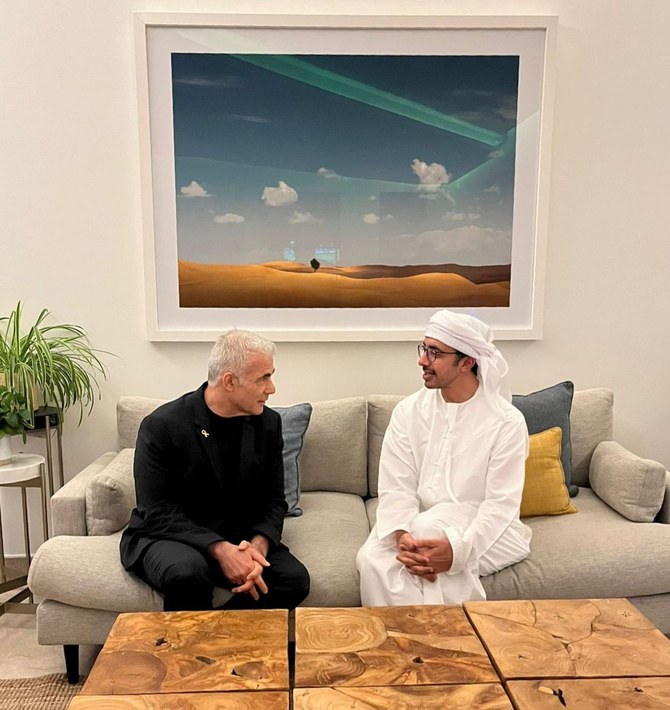
- Sheikh Abdullah stressed the need to restart talks on the two-state solution in Palestine
ABU DHABI: The UAE’s Foreign Minister Sheikh Abdullah bin Zayed Al-Nahyan held discussions on developments in Gaza with Israel’s opposition leader Yair Lapid in Abu Dhabi recently, Emirates News Agency reported on Thursday.
During the meeting, Sheikh Abdullah stressed the need to restart talks on the two-state solution in Palestine, which he said would ensure permanent regional peace and security.
He called for additional efforts to reach an immediate ceasefire in Gaza, which would prevent the conflict spreading to the rest of the region.
Sheikh Abdullah added that it was important for aid to reach Gaza, and that the lives of civilians should be protected.
Palestinian security force kills Islamic Jihad gunman in rare internal clash
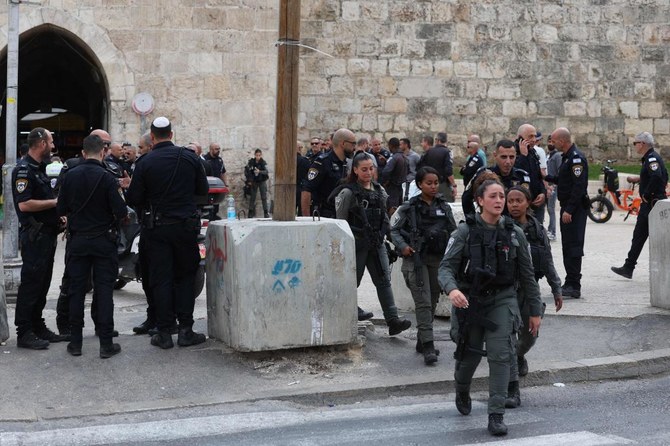
- Al-Foul was “treacherously ... targeted in his car” without provocation, the brigades said in a statement. “This crime is just like any assassination by Israeli special forces.”
RAMALLAH: Palestinian security officers killed a gunman in the occupied West Bank on Thursday, a rare intra-Palestinian clash whose circumstances were disputed and which the fighter’s faction described as an Israeli-style “assassination”.
Palestinian Authority security services spokesperson Talak Dweikat said a force sent to patrol Tulkarm overnight came under fire and shot back, hitting the gunman. He died from his wounds in hospital.
Videos circulated online, and which Reuters was not immediately able to confirm, showed a car being hit by gunfire.
A local armed group, the Tulkarm and Nour Shams Camp Brigades, claimed the dead man, Ahmed Abu Al-Foul, as its member with affiliation to the largely militant group Islamic Jihad.
Al-Foul was “treacherously ... targeted in his car” without provocation, the brigades said in a statement. “This crime is just like any assassination by Israeli special forces.”
President Mahmoud Abbas’ PA wields limited self-rule in the West Bank, and sometimes coordinates security with Israel.
Parts of the territory have drifted into chaos and poverty, with the PA and Israel trading blame, especially since ties have been further strained by Israel’s offensive in Gaza.
Hamas, an Islamic Jihad ally which rules the Gaza Strip and has chafed at Abbas’ strategy of seeking diplomatic accommodation with Israel, denounced “the attacks by the PA’s security forces on our people and our resistance fighters”.
Palestinian security forces and gunmen have exchanged gunfire several times in the last year, but deaths are rare.
EU offers $1 bln in economic, security support to Lebanon
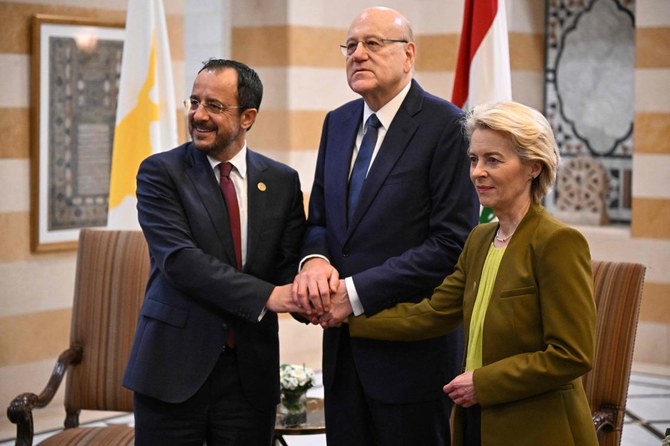
- The funds would be available from this year until 2027
- Von der Leyen said the support package would help bolster basic services in Lebanon, including health and education
BEIRUT: The European Union has offered Lebanon a financial package of 1 billion euros ($1.07 billion) to support its faltering economy and its security forces, European Commission President Ursula von der Leyen said on Thursday during a visit to Beirut.
Von der Leyen said the support package would help bolster basic services in Lebanon, including health and education, though she added that it was crucial for Beirut to “take forward economic, financial and banking reforms” to revitalize the business environment and banking sector.
Speaking alongside Lebanon’s Prime Minister Najib Mikati and Cypriot President Nikos Christodoulides, she said security support to the Lebanese army, the internal security forces and General Security would be focused on providing training, equipment and infrastructure to improve border management.
Lebanon’s economy began to unravel in 2019 after decades of profligate spending and corruption. However, vested interests in the ruling elite have stalled financial reforms that would grant Lebanon access to a $3 billion aid package from the International Monetary Fund.
As the crisis has been allowed to fester, most Lebanese have been locked out of their bank savings, the local currency has collapsed and public institutions — from schools to the army — have struggled to keep functioning.
In parallel, Lebanon has seen a rise in migrant boats taking off from its shores and heading to Europe – with nearby Cyprus and increasingly Italy, too, as the main destinations, researchers say.
Iran slaps sanctions on US, UK over Israel support
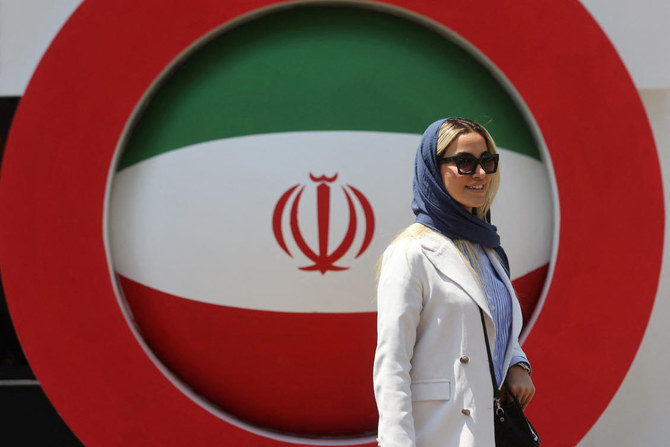
- Sanctions targeted seven Americans
- British officials and entities targeted include Secretary of State for Defense Grant Shapps
TEHRAN: Iran announced on Thursday sanctions on several American and British individuals and entities for supporting Israel in its war against the Palestinian militant group Hamas.
The Islamic republic, the regional arch-foe of Israel, unveiled the punitive measures in a statement from its foreign ministry.
It said the sanctions targeted seven Americans, including General Bryan P. Fenton, commander of the US special operations command, and Vice Admiral Brad Cooper, a former commander of the US Navy’s Fifth Fleet.
British officials and entities targeted include Secretary of State for Defense Grant Shapps, commander of the British army strategic command James Hockenhull and the UK Royal Navy in the Red Sea.
Penalties were also announced against US firms Lockheed Martin and Chevron and British counterparts Elbit Systems, Parker Meggitt and Rafael UK.
The ministry said the sanctions include “blocking of accounts and transactions in the Iranian financial and banking systems, blocking of assets within the jurisdiction of the Islamic Republic of Iran as well as prohibition of visa issuance and entry to the Iranian territory.”
The impact of these measures on the individuals or entities, as well as their assets or dealings with Iran, remains unclear.
The war in the Gaza Strip erupted after the October 7 attack by Palestinian militants on Israel which killed 1,170 people, mostly civilians, according an AFP tally based on official Israeli figures.
Iran backs Hamas but has denied any direct involvement in the attack.
Israel’s retaliatory offensive against Hamas has since killed at least 34,568 people in Gaza, mostly women and children, according to the Hamas-run territory’s health ministry.




